| Srl | Item |
| 1 |
ID:
114818
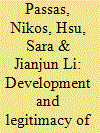

|
|
|
|
|
| Publication |
2012.
|
| Summary/Abstract |
As in many other developing countries, Chinese businesses and individuals frequently fund transactions using informal, unmonitored financial methods. The impact of this phenomenon is both positive and negative: positive when funds are used for legitimate purposes, such as providing much needed working capital for businesses, and negative when funds are used for illegitimate and/or illegal purposes, such as to finance criminal activity or launder proceeds of crime. There is a dearth of literature and research on this topic. Further study is necessary to understand the precise political, economic and social reasons for this diversity of non-bank financing and its legal and economic implications. This paper aims to pave the ground for such research and analytical work by reviewing the existing literature, placing it into context and raising the main questions that must be answered in future work.
|
|
|
|
|
|
|
|
|
|
|
|
|
|
|
|
| 2 |
ID:
167581
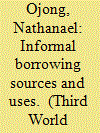

|
|
|
|
|
| Summary/Abstract |
This article seeks to analyse the informal borrowing sources of the poor as well as the purposes for borrowing. The obsession on characterising the poor as financially excluded fails to grasp their active financial lives. This article emphasises how relations of credit/debt are rooted in complex social and cultural forces. It is precisely because of the social embeddedness of credit that family finance, though interest-free, is not a first resort. Similarly, credit in kind from shopkeepers, though critical to consumption smoothing, is detested by some people. Also, it is argued that the involvement of the traditional leader in repayment enforcement in informal financial groups challenges the economistic narrative that attempts to separate credit from cultural norms.
|
|
|
|
|
|
|
|
|
|
|
|
|
|
|
|
| 3 |
ID:
130057
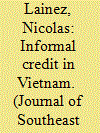

|
|
|
|
|
| Publication |
2014.
|
| Summary/Abstract |
The state of knowledge about finance and credit in Vietnam remains fragmentary despite
the interest that economists have shown in the topic over the past fifteen years. This paper explores why informal finance continues to enjoy great popularity among rural households despite its high price and risks in Southern Vietnam. This research note examines in detail three modes of credit, and shows that borrowers' perception of informal credit does not always correspond to that of government financial and international institutions. The social dimension of informal finance is crucial to understanding its prevalence, adaptability and continuity in Vietnam. From the point of view of the borrowers, informal credit is not perceived as an evil but rather an economic necessity.
|
|
|
|
|
|
|
|
|
|
|
|
|
|
|
|
| 4 |
ID:
138152
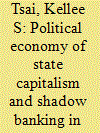

|
|
|
|
|
| Summary/Abstract |
The Xi-Li administration faces the dual challenge of managing state capitalism and shadow banking as China enters a phase of more moderate economic growth. During China’s first three decades of reform, private sector development occurred in parallel with prioritization of state-owned enterprises in strategic industries, and growth surged. This pattern of state capitalism rested on an unarticulated bifurcated financing arrangement whereby the formal banking system primarily served public enterprises, while private businesses relied primarily on informal finance. However, China’s response to global financial crisis disrupted the preceding equilibrium of financial dualism under state capitalism. Unprecedented expansion of bank lending after 2008 created opportunities for a host of state economic actors—including SOEs, state banks, and local governments—to expand their participation in off-balance sheet activities.
|
|
|
|
|
|
|
|
|
|
|
|
|
|
|
|
| 5 |
ID:
121804
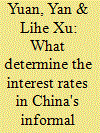

|
|
|
|
|
| Publication |
2013.
|
| Summary/Abstract |
The interest rate is one of the most important factors in farmers' decision-making of borrowing and lending in the informal financial market in China. This paper explores the determinants of the interest rate with microfinance data. Results show that the income disparity, the relationship between borrowers and lenders, the usage of borrowing, and formal credit constraints are important factors affecting interest rates. More importantly, to borrow from those in the higher income hierarchy, farmers have to bear higher interest rates. We attribute this to different social capitals across income groups and higher default risks for the poor. This paper contributes to a better understanding of the informal financial market in rural China and sheds light on the mechanism of higher informal interest rate formation.
|
|
|
|
|
|
|
|
|
|
|
|
|
|
|
|